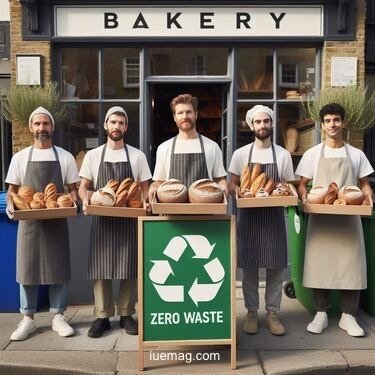

John Gessin Shares How Small Businesses Can Benefit From Organic Green Waste Recovery And Food Gleaning Programs
 Small businesses often face sustainability challenges regarding reducing their environmental footprint and contributing positively to society. However, many small businesses can benefit significantly from implementing environmentally responsible practices. Organic green waste recovery and food-gleaning programs are two such practices that can be incredibly impactful for small businesses. In this article, John Gessin will discuss ways small businesses can benefit from implementing organic green waste recovery and food-gleaning programs.
Small businesses often face sustainability challenges regarding reducing their environmental footprint and contributing positively to society. However, many small businesses can benefit significantly from implementing environmentally responsible practices. Organic green waste recovery and food-gleaning programs are two such practices that can be incredibly impactful for small businesses. In this article, John Gessin will discuss ways small businesses can benefit from implementing organic green waste recovery and food-gleaning programs.Sustainable Waste Management
Organic green waste recovery programs can capture organic material that would be sent to a landfill. The decomposing food creates methane, which damages the environment. Through waste reduction, composting, and reuse, small businesses can mitigate their environmental impact while saving on disposal fees.
Additionally, food-gleaning programs allow small businesses to redirect surplus food that would otherwise go to waste. This helps the environment, supports local communities, and reduces food insecurity.
Positive Impact On Brand Image
Consumers today are more environmentally conscious and are increasingly choosing to support businesses with sustainable practices. By implementing organic green waste recovery and food-gleaning programs, small businesses can showcase their commitment to sustainability, which can attract and retain eco-conscious customers.
 On the other hand, a lack of sustainable practices can harm a business's reputation and turn away potential customers. Therefore, implementing these programs can positively impact a small business's brand image.
On the other hand, a lack of sustainable practices can harm a business's reputation and turn away potential customers. Therefore, implementing these programs can positively impact a small business's brand image.Reduced Carbon Footprint
Organic waste that decomposes in landfills releases methane, a potent greenhouse gas. Methane has a warming effect 25 times more significant than carbon dioxide. Techniques such as utilizing organic waste to produce biogas through anaerobic digestion can offset greenhouse emissions.
This technology captures the methane and converts it into heat, electricity, and transport fuel. Businesses can produce their electricity instead of relying on the grid or using biogas as fuel for their vehicles, reducing their carbon footprint. Additionally, food-gleaning programs can reduce the carbon footprint associated with transporting surplus food to landfills.
Improved Health And Sanitation
Organic waste attracts rodents and pests, creating unhygienic conditions. The odor created by decomposing food waste can be nauseating. The implementation of organic waste recovery programs eliminates organic matter from open-air piles or waste bins, reducing odor emissions and providing a more sanitary waste management process.
Another way small businesses can improve health and sanitation is by donating surplus food through gleaning programs. This ensures that excess food doesn't go to waste, reducing the risk of contamination and foodborne illnesses.
Food Recovery Programs
Small businesses in the hospitality industry (e.g., hotels and restaurants) often deal with food waste daily. Food recovery programs offer an opportunity to donate excess food to local charities that assist individuals and families struggling to put food on the table. Donating food can be seen as a charitable gesture, benefiting the less fortunate and supporting the local community. Furthermore, food recovery programs can reduce food waste and costs for the business.
Enhanced Public Image
Consumers demand more environmentally responsible practices from the businesses they patronize. Committing to sustainable practices such as organic waste recovery and food-gleaning programs enhances a business’s reputation and demonstrates a commitment to the environment and the community.
For instance, businesses can proudly promote their participation in food-gleaning programs on social media, generating positive publicity and attracting new customers who align with their values. This further boosts the business's public image and can set it apart from its competitors.
Economic Opportunities

The organic waste industry is growing rapidly. By implementing organic green waste recovery programs, small businesses can tap into this market by selling the compost produced from their organic waste or generating revenue through biogas production. This can provide additional revenue streams for small businesses and contribute to the circular economy.
However, food-gleaning programs can also provide economic opportunities for small businesses. Donating surplus food can result in tax deductions and reduce waste disposal fees, saving businesses money and contributing to their bottom line.
Cost Savings
The implementation of organic waste management practices and resource recovery programs can result in cost savings for the business. By reducing the amount of waste sent to landfills, fewer disposal fees and operational expenses need to be incurred. Furthermore, businesses can benefit from selling the compost generated by organic waste recovery programs.
For example, restaurants can use the compost to grow their own produce or sell it to local farmers. This reduces waste and costs and creates a sustainable supply chain.
Increased Efficiency
Implementing sustainable waste management systems saves time and resources. Recycling food waste and composting leftover plant material reduces the time and labor spent managing waste. Instead of sorting through vast amounts of garbage, small businesses can focus on running their core operations and growing their bottom line.
In addition, food-gleaning programs can help businesses streamline their inventory and reduce waste in their operations. This increased efficiency can lead to cost savings and improved productivity.
ConclusionJohn Gessin understands that green waste recovery and food-gleaning programs offer multiple benefits to small businesses. They help mitigate environmental harm, support local communities, and improve business outcomes. With the implementation of these programs, small businesses can create a more sustainable and responsible operating model. Small businesses can efficiently manage their waste and create value from excess organic material by partnering with local charities and waste management professionals. Together, we can all contribute to making the world a better place, one small business at a time.
Copyrights © 2025 Inspiration Unlimited - iU - Online Global Positivity Media
Any facts, figures or references stated here are made by the author & don't reflect the endorsement of iU at all times unless otherwise drafted by official staff at iU. A part [small/large] could be AI generated content at times and it's inevitable today. If you have a feedback particularly with regards to that, feel free to let us know. This article was first published here on 3rd January 2024.
Overthinking? Uninspired? Brain Fogged?
Let's Reset That! Try iU's Positivity Chat NOW!

All chats are end-to-end encrypted by WhatsApp and won't be shared anywhere [won't be stored either].


